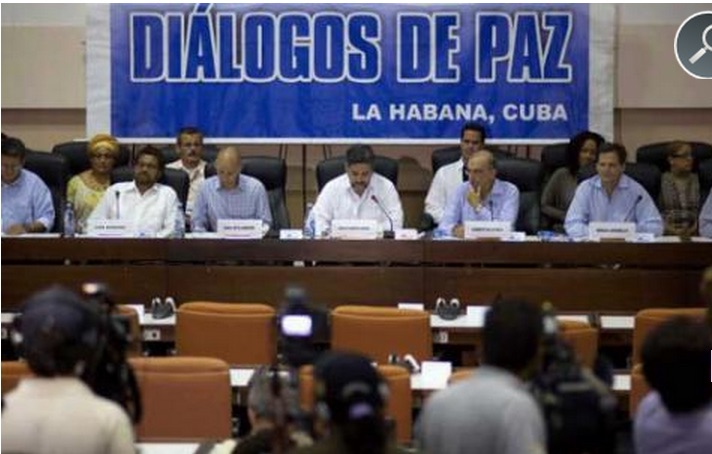FREE FLOW OF INFORMATION
An article from Ahora Cuba
The FARC-EP and the Colombian government closed the 37th cycle of peace talks with the decision to establish a Commission for Clarification of Truth, Coexistence and Non-Repetition.

Such a Commission will be set up after the Final Peace Agreement, and will have three main objectives, Rodolfo Benitez, Cuba guarantor at the negotiation table established in this capital since 2012, said yesterday in a news conference.
Representatives of the Revolutionary Armed Forces of Colombia-People’s Army (FARC-EP) and the government of President Juan Manuel Santos are attending this roundtable discussion.
The first of those objectives is to contribute to the clarification of what happened (…) and provide a full explanation of the complexity of the conflict, said Benitez, accompanied by the government and insurgent peace delegations.
The Commission should contribute to the recognition of the victims as citizens who saw their rights violated and the voluntary recognition of individual and collective responsibilities.
It should also promote coexistence in the territories, by means of an atmosphere of dialogue and the creation of spaces in which the victims are dignified, he said.
According to Benitez, the Commission will be an independent, impartial and extrajudicial mechanism, a part of the comprehensive system of truth, justice, reparation and non-repetition that has to agree to satisfy the rights of victims, end the conflict, and achieve peace.
On the other hand, Ivan Marquez, head of the guerrilla delegation, praised the establishment of the truth Commission as a mechanism of justice and reparation, and requested the opening of the State’s files on the conflict for the clarification of what happened regarding this long confrontation.
(Click here for an article in Spanish on this subject.)
What is happening in Colombia, Is peace possible?
This discussion question applies to the following articles:
Colombian villagers practice non-violent resistance
Legacy of a Nonviolent Political Leader: Governor Guillermo Gaviria of Colombia
Working for a Culture of Peace in the Valley of the Cauca, Colombia
Remise des Prix de la Fondation Chirac pour la prévention des conflits
Chirac Foundation Prize for Conflict Prevention
The University and the Peace Process in Colombia
La paz supera coyunturas y fronteras (Colombia y Venezuela)
Peace is not stopped by borders (Colombia and Venezuela)
Campesinos colombianos celebran primer acuerdo agrario de paz
Colombian Govt and FARC Reach Agreement on First Stage of Peace Talks
Colombia Campaña de la ONU “La Paz es mía”
UN Campaign in Colombia:
Presidente colombiano reactivará la Comisión Nacional de Paz
Colombian President to Reactivate National Peace Commission
FARC-EP y Gobierno colombiano avanzan en acuerdos para la paz
FARC-EP and Colombia Government advance in their peace accords
Colombia debe ser también la Nación más educada en derechos humanos: Presidente Santos
Colombia should also be the most educated nation in human rights : President Santos
Gabriel García Márquez and the peace process in Colombia
Colombia amanece con un presidente reelecto, esperanzada en la paz
Colombia awakens to hopes for peace with the re-election of their president
Mujer, ruralidad y memoria, entre los temas del congreso de paz (Bogotá, Colombia)
Women, rurality and historical memory among the themes of the Peace Congress (Bogotá, Colombia)
Sonia Ines Goéz Orrego on a speaking tour in the U.S. to share her experience building peace in Colombia
Pax Christi International – Peace Award 2015: Women, Peace and Security Collective for Reflection and Action (Colombia)